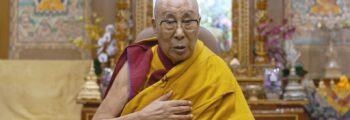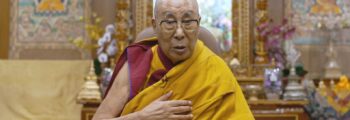By — BT NEWSDESK
Dharamshala: The spiritual leader of Tibet, His Holiness the Dalai Lama, extended His warmest greetings to Tibetans in Tibet and in exile on the occasion of the traditional Tibetan New Year, Losar 2151—the year of the Wood-Dragon.
His Holiness the Dalai Lama’s Losar Message to Tibetans:
I’d like to wish my fellow Tibetans, both inside Tibet and those in exile, a Happy New Year this Losar—Tashi Delek to all of you!
Despite undergoing great difficulties in exile and living under a powerful Communist Chinese regime, our people, the majority of whom are inside of Tibet, have remained unscathed while I have been the leader.
Despite undergoing great difficulties in exile and living under a powerful Communist Chinese regime, the faith and aspiration of our people, the majority of whom are inside Tibet, have remained undiminished while I have been the leader.
Although the Communist Chinese rulers, after the ‘(so-called) peaceful liberation’, have wished that we Tibetans forget our religious faith, we have held onto our convictions and our culture even more firmly—this is very good. Today, there is a renewed interest in Buddhism, not only among Tibetans, but even among some Chinese. In many parts of the world today, Tibetan spiritual and cultural traditions are regarded as logical, rational and of practical benefit when closely considered since they enable us to transform our minds in a positive way and bring about inner peace.
Nowadays, an increasing number of people in Western countries are taking an interest in Tibetan culture and spirituality. I’m also aware of an increasing number of Western scientists who admire the methods for developing a kind heart that is found in our culture, although they lack any religious belief.
The Communist Chinese have attempted systematically to eliminate our spiritual and cultural heritage. However, it has become clear that rather than destroying it, there is a renewed interest in our cultural traditions in the world today.
Our practice of kindness, the custom of being compassionate even to insects and other tiny creatures, has been passed down for generations from our forefathers. This is something that people around the world, who previously paid little attention to Tibetan Buddhism, are now taking an interest in our culture of good-heartedness and morality. So, it is important that we Tibetans take care of our culture and civilization by regarding it as one of the world’s precious treasures.
As for me, I was born in Siling (in north-eastern Tibet) and moved to Lhasa when I was young. The Tibetan custom of cultivating a good heart lies at the core of our Tibetan Buddhist tradition that consist of Buddhist teachings of the highest quality of the Buddha’s teachings and which we have preserved. Buddhist countries like Thailand and Burma preserve excellent Buddhist practices, but only Tibetans and Mongolians engage in rigorous study of the Dharma, although even in Mongolia, this has declined so much.
Tibet’s civilized culture is like a universal treasure. You should continue to uphold it. As I said, people all over the world increasingly look to our culture and religion for inspiration, not because it includes prayers and rituals like making offerings, performing prostrations and so on, but because it deals with cultivating the mind. It explains how to enhance our sense of love and compassion. I feel it’s very important that we put these methods into practice ourselves to set an example for other people around the world.
Tibetans are generally recognised as kind-hearted people, but we were not born in a different way, we are the same as other human beings. However, we’ve been brought up since childhood to have a kind heart and to observe the good habit of not killing even insects. We should keep this up and try to extend our kind-heartedness to people all over the world, whether they believe in religion or not.
I urge you to keep this in mind and put effort into it.
Regarding Buddhist psychology, among Buddhist traditions, Tibetan Buddhism presents the most profound understanding of it. The classic treatises studied in the great monastic universities of Tibet, such as Sera and Drepung, present a thorough understanding of the workings of the mind and emotions. It’s because this understanding contains methods for tackling mental problems in practical ways that it is so valuable. We have preserved not only the words of explanation but also the ways to implement them through a combination of study and practice.
This tradition of cultivating a good heart through a combined practice of study and contemplation that we Tibetans have preserved is now attracting interest around the world. Therefore, we Tibetans should do our best to maintain it with courage and determination.
I wish, in particular, to express my appreciation for my fellow Tibetans inside Tibet for the unflinching faith and devotion they possess. Still, I think it’s important that the new generation of Tibetans has a deep understanding of the good customs we have upheld for more than a thousand years, not just because they are our customs but also because they accord with reason. In the reality of today’s world, I think it’s necessary that the new generation take a fresh look at the traditions we’ve preserved in the light of Western scientific interest. They need to understand why people in the West with no particular belief in religion take interest in our traditions. And they need to be able to recognize the value of the centuries-old cherished treasures of Tibet in order to preserve them well.
We all talk about peace, expressing hope for peace in the world. But peace has to be developed in our minds; it’s not just about the absence of weapons. And the Tibetan custom of cultivating a warm heart is the best means for developing peace of mind. Please keep it up.
That’s all.
Tashi Delek to you!













